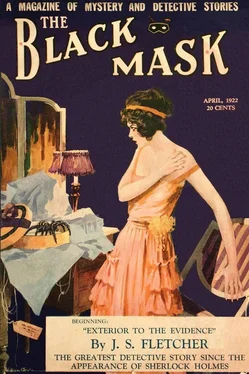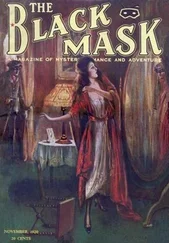J. Fletcher - The Black Mask Magazine (Vol. 5, No. 1 — April 1922)
Здесь есть возможность читать онлайн «J. Fletcher - The Black Mask Magazine (Vol. 5, No. 1 — April 1922)» весь текст электронной книги совершенно бесплатно (целиком полную версию без сокращений). В некоторых случаях можно слушать аудио, скачать через торрент в формате fb2 и присутствует краткое содержание. Город: New York, Год выпуска: 1922, Издательство: Pro-distributors Publishing Company, Жанр: Детектив, на английском языке. Описание произведения, (предисловие) а так же отзывы посетителей доступны на портале библиотеки ЛибКат.
- Название:The Black Mask Magazine (Vol. 5, No. 1 — April 1922)
- Автор:
- Издательство:Pro-distributors Publishing Company
- Жанр:
- Год:1922
- Город:New York
- ISBN:нет данных
- Рейтинг книги:3 / 5. Голосов: 1
-
Избранное:Добавить в избранное
- Отзывы:
-
Ваша оценка:
- 60
- 1
- 2
- 3
- 4
- 5
The Black Mask Magazine (Vol. 5, No. 1 — April 1922): краткое содержание, описание и аннотация
Предлагаем к чтению аннотацию, описание, краткое содержание или предисловие (зависит от того, что написал сам автор книги «The Black Mask Magazine (Vol. 5, No. 1 — April 1922)»). Если вы не нашли необходимую информацию о книге — напишите в комментариях, мы постараемся отыскать её.
The Black Mask Magazine (Vol. 5, No. 1 — April 1922) — читать онлайн бесплатно полную книгу (весь текст) целиком
Ниже представлен текст книги, разбитый по страницам. Система сохранения места последней прочитанной страницы, позволяет с удобством читать онлайн бесплатно книгу «The Black Mask Magazine (Vol. 5, No. 1 — April 1922)», без необходимости каждый раз заново искать на чём Вы остановились. Поставьте закладку, и сможете в любой момент перейти на страницу, на которой закончили чтение.
Интервал:
Закладка:
“I thought so,” said Jamison’s voice wearily. “It was a sloppy job.”
There was an infinitely bright flash and the room was full of smoke.
IV
“You’re mugged, now,” observed Jamison. “I guess a flash-light picture will go well in court...”
“His ears were pink,” explained Jamison, his tone indicating the ultimate of boredom. “His ears were nice and pink. That gave him away.”
Craig was huddled in a chair in the police-station. The big policeman stood guard beside him and the desk-sergeant listened sympathetically to Jamison’s tale of woe.
“My Gawd,” said Jamison disgustedly, “I haven’t seen a really neat job in so long you’d think everybody with brains had turned honest. Look at him, now. He passed through here once a month for six months or so, carrying stuff from New Orleans to New York and back. He was a regular at the hotel, and the clerk always gave him the same room, and he saw it had one o’ these cheap made-by-the-million bureaus in it. And he set to work from that!”
He flung away his perpetual cigarette and grunted.
“He took some measurements of the inside, an’ got a piece of veneer to fit the bottom of one of the drawers. Then, today, he climbed off the train, went to the hotel, took his bonds and laid ’em, neat, in the drawer, trimmed up his veneer to fit exactly, and glued it down on top of ’em. To look at it, it was a perfectly empty drawer, and nobody looks for secret compartments in hotel furniture, particularly of the made-by-the-million kind. He wandered downstairs, ate his dinner while the glue dried, smoked a cigar, and went back up to his room and yelled bloody murder. He thought he’d get away with the story that his room had been robbed while he was out!”
The desk-sergeant shook his head sympathetically.
“Tst! Tst!...” he said commiseratingly.
“He had a good make-up on” commented Jamison morosely. “He looked like the wrath o’ Gawd, and he played his part pretty well, but he overdid it, of course. Showed me a note-book to check up his movements by — and he’d made an entry in it while there was a bit of glue on his finger. The smudge told a lot, since I’d already made up my mind he was tryin’ to steal from himself. Say” — he addressed the prisoner — “were you thinkin’ maybe your firm would prosecute you for the theft and be unable to get a conviction for lack of evidence?”
The prisoner seemed to shrink a little farther into himself, but did not reply.
“That was it,” said Jamison gloomily. “Once he’d been tried, you know, they couldn’t have done a thing no matter how much proof they got that he had recovered and was selling the bonds later.”
“He gave himself away, you say?” the desk-sergeant asked.
“Dead away,” admitted Jamison depressedly. “I knew he’d done it, the minute I first saw him, and if that wasn’t enough, I sent him out to get the room-clerk and he stopped in the doorway to take a last look straight where he’d put the bonds. And the first place he looked when he came back was the same spot. It was a shame to pinch him, he was so innocent.”
“But can you jug him?” queried the desk-sergeant.
“Jug him? I could hang him, " asserted Jamison in the profoundest disgust. “I got Murphy to frame a story that he’d found the bonds on a bell-hop, and when Murphy—”
“Me name's O’Ryan, sorr,” interrupted the policeman.
“When O’Ryan sprang the plant and we went out, Craig went straight to look at the bonds and make sure they were safe. All I had to do was take Murph — O’Ryan by the hand and wait two minutes and then swing in the door and pull a flash-pistol. I had Craig neatly mugged with the bonds in his hands. Could I jug him, I ask you?”
“You could,” agreed the desk-sergeant. “But you keep saying all along that you knew he’d hidden out the bonds. How’d you know that?”
“His ears were pink,” said Jamison wearily. “If you saw a man who’d just been robbed of a fortune, you’d expect him to look sort of pale, wouldn’t you?”
“I would that.”
“This man was made up pretty good. His eyes looked sunk way back in his head, and he was pale to just the right extent. He put over the voice stuff pretty well, too. He’d made himself up with number one dead white, that he carried in his shaving-soap tube, but he’d left his ears pink, a nice, healthy pink. And I had only to take one look to know what was up.”
“’Twas careless,” said the desk-sergeant.
“Careless? It was criminal!” Jamison seemed to be mourning over the decay of crime. “I haven’t had a real good case in a coon’s age. Crooks haven’t got brains any more.”
And he shook his head in the most abysmal gloom.
Hankenson’s Perfect Crime
by Ward Sterling
I
Having decided to kill Chester O’Hearn, Hankenson commenced making his plans.
He had often read of the perfect crime — the fool proof crime to which there is no clew, but which always ends disastrously for the perpetrator because of some straggling little thread left untied. In his case there would be no slip-up. The average murderer, he believed, killed on impulse; few, if any, went about it as he was doing, weighing every minor detail, covering every track as he proceeded.
Carefully — for he felt that he had months ahead of him in which to complete his arrangements — he went over every possible contingency. Every method of killing known to civilized man was carefully jotted down, newspaper clippings relating to crime were card-indexed and filed away for future reference.
When he had secured all of the information he desired, he sat down, spread the various data before him and dissected them bit by bit. This work completed, he tabulated the results carefully — then rejected the whole. The crimes of others served him as an object lesson in what to avoid.
There were two pitfalls to be watched for. One was the fact that O’Hearn was carrying on a liaison with Mrs. Hankenson. In spite of their efforts to avoid scandal several people of their acquaintance knew which way the straws were blowing, and one or two 120 had hinted at the facts to the husband. And O’Hearn was a man of great wealth and Hankenson’s cousin. Hankenson, upon his death, would inherit the greater part of his millions.
Therefore any suspicion of murder would cause people to look naturally in Hankenson’s direction.
Therefore there must be no suspicion of murder.
To kill O’Hearn and have it appear as a suicide would never do either. People always talked too much about suicide and inquired into the whys and wherefores. Talking might cause some blundering officer to accidentally guess at the truth.
After debating the matter thoroughly in his own mind, he finally decided that there was but one solution to the problem.
First — O’Hearn must be killed in such a way that it would look like an accident.
Second — When the killing took place Hankenson must be close by, but not actually present.
Third — Others must be witnesses to the tragedy. There must be enough witnesses to prove conclusively that an accident had been the cause of death, and they must be men and women whose testimony would be accepted without a question of doubt in any court in the land.
These things having been decided upon, Hankenson had next to select a method of committing the deed.
O’Hearn was an ardent sportsman, hunter and trapshooter. What, then, would be more natural than that he should be killed in the field and by his own gun?
But how?
It took Hankenson several weeks to decide this point. Here, as before, details were mentally discussed, catalogued and discarded. The solution was finally reached through the application of chemistry. And, having arrived at a decision, Hankenson applied himself vigorously and with his usual painstaking thoroughness to the task of putting the affair through to a successful conclusion.
Читать дальшеИнтервал:
Закладка:
Похожие книги на «The Black Mask Magazine (Vol. 5, No. 1 — April 1922)»
Представляем Вашему вниманию похожие книги на «The Black Mask Magazine (Vol. 5, No. 1 — April 1922)» списком для выбора. Мы отобрали схожую по названию и смыслу литературу в надежде предоставить читателям больше вариантов отыскать новые, интересные, ещё непрочитанные произведения.
Обсуждение, отзывы о книге «The Black Mask Magazine (Vol. 5, No. 1 — April 1922)» и просто собственные мнения читателей. Оставьте ваши комментарии, напишите, что Вы думаете о произведении, его смысле или главных героях. Укажите что конкретно понравилось, а что нет, и почему Вы так считаете.












